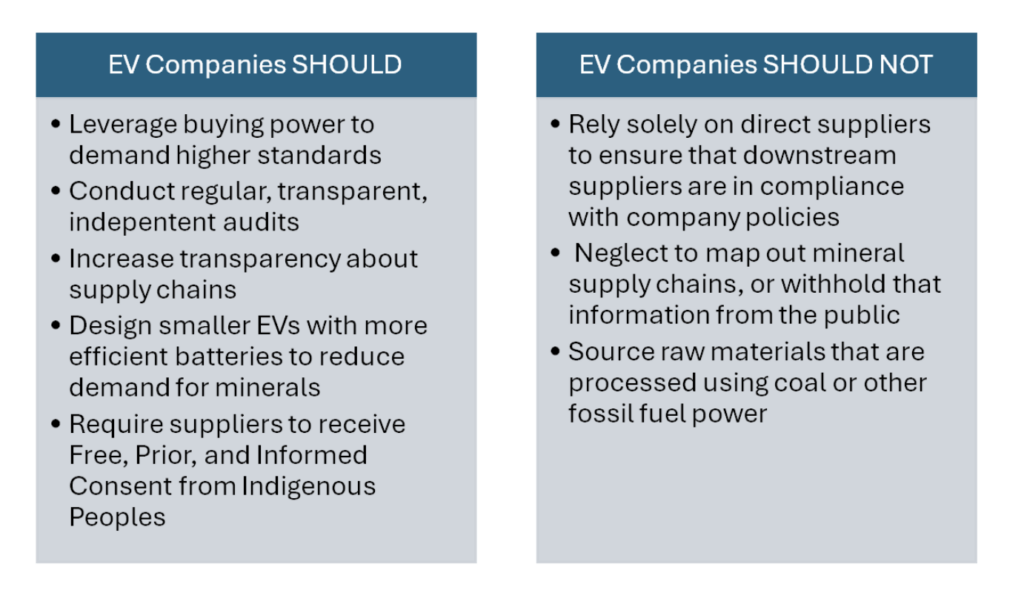(San Francisco, August 20, 2024) — Electric vehicle companies should take concrete and time-bound steps to prevent and mitigate climate, human rights, and environmental harms in their transition mineral supply chains, Climate Rights International said today as it released correspondence with some of the world’s largest automakers.
The transition to renewable energy is essential to mitigate the climate crisis. Transition minerals – including nickel, lithium, copper, and cobalt – are needed to build the renewable energy technologies, like batteries and solar panels, necessary to transition away from fossil fuels. EV companies must take responsibility for their supply chains and ensure that the minerals in their vehicles do not drive the sorts of appalling human rights, environmental, and climate harms that have long characterized mining and other extractive industries in Indonesia and around the globe.
“The urgency to secure minerals for the energy transition is not an excuse for companies to neglect their human rights and environmental obligations,” said Krista Shennum, researcher at Climate Rights International. “Electric vehicle companies should immediately use their leverage to push mining companies and other companies in their supply chains to address harms to local communities and the environment, and, if necessary, stop sourcing minerals from companies responsible for abuses.”

As Climate Rights International documented in its January 2024 report, “Nickel Unearthed: The Human and Climate Costs of Indonesia’s Nickel Industry,” communities living near nickel mining and processing projects in North Maluku, Indonesia, are experiencing significant pollution of their air and water, land grabbing, deforestation, and harm to their standard of living. Indonesia is the world’s largest producer of nickel, and much of the nickel mined in places like North Maluku is intended to produce batteries for electric vehicles. Yet, local communities do not always receive benefits from these projects. Adlun Fikri, a 29-year-old activist from the coastal village of Sagea in North Maluku, told Climate Rights International,
In the upstream area where they mine, it’s destructive, degrading forest, destroying forest, and causing human rights violations. The local residents here bear the cost for global ambition [of net zero]. Western people enjoy the electric vehicle, and meanwhile we get the negative impact.
“While EV corporate headquarters in places like Germany, France, Japan, South Korea, the U.S. and China may seem far removed from mining areas, the actions of those companies have a profound impact on the lives of communities living near mining and mineral processing projects,” said Shennum.
EV Company Responses to Climate Rights International
Climate Rights International has written to 19 electric vehicle companies to seek information about the climate, human rights, and environmental consequences of their transition mineral supply chains and their due diligence practices.
Before the January 2024 release of “Nickel Unearthed,” Climate Rights International wrote to Tesla, Ford, and Volkswagen, which source nickel from Indonesia, including from companies that have major nickel operations at the Indonesia Weda Bay Industrial Park. Ford replied in writing as requested before the report was released and continues to engage in discussions. Tesla did not reply in writing, but has engaged in discussions. Volkswagen responded in writing after the report was released and has engaged in limited discussions.
In April and May 2024, Climate Rights International wrote to sixteen additional electric vehicle companies. Only four – General Motors, Mercedes-Benz, BMW Group, and Renault – responded. Links to their responses may be found below. The other twelve companies have not responded, demonstrating an apparent unwillingness to provide basic information on how they ensure their supply chains are not contributing to serious climate, human rights, and environmental violations. The twelve are BYD, GAC Motor, Geely, Honda, Hyundai, Kia, Nio, Nissan, SAIC Motor, Stellantis, Subaru, and Volvo.
Climate Rights International asked companies how they ensured that the mining and smelting of transition minerals used in their EVs do not contribute to human rights and environmental harms. In the most recent round of responses, all four of the companies that responded reported having policies governing their suppliers’ conduct:
- Renault stated that, under its human rights vigilance plan, which currently applies to cobalt and minerals from conflict and high-risk areas, the company, “continuously ensures the proper performance of reasonable due diligence and remediation procedures,” in order to be in alignment with the UN Guiding Principles on Business and Human Rights, Fundamental Conventions of the International Labour Organisation, OECD Guidelines for Multinational Enterprises, Fundamental Rights at Work, and the International Bill of Human Rights.
- Mercedes-Benz stated that it conducts risk-oriented raw material assessments for 24 raw materials, based on the logic and methodology of the UN Guiding Principles on Business and Human Rights, with the goal to, “proactively identify and mitigate risks in our raw material supply chains.” Mercedes-Benz further elaborated that the assessment consists of three steps: 1) increasing transparency along raw material supply chains, 2) identifying risk hotspots in these supply chains, and 3) defining and implementing measures for the risk hotspots.
- BMW Group stated, “As part of our due diligence for our supply chain, the BMW Group continuously monitors compliance with requirements through procedures such as risk filters, media analyses and with supply chain mapping, among others.” BMW also noted that it has created a closed-loop material cycle to reuse nickel, lithium, and cobalt from some of its batteries in order to reduce demand for raw materials.
- General Motors stated, “In the event of nonconformance with our Supplier Code of Conduct, we work with our suppliers through training and direct engagement to enable them to responsibly manage human rights.”
While it is positive that many EV companies have policies outlining expectations of their suppliers, it is unfortunately not always clear how companies ensure that their suppliers comply with those expectations or what companies do if they learn a supplier is not in compliance. For example, General Motors’ policies do not clarify whether the Supplier Code of Conduct extends beyond its direct suppliers to the companies that supply its suppliers (or upstream suppliers). In addition, at the time of Renault’s response in May 2024, its human rights policy did not cover all battery minerals, although they stated that they plan to extend the policy to additional raw materials, including nickel, by the end of 2024.
In order to ensure that their suppliers are in compliance with the company’s supplier code of conduct or other related policies, EV companies should:
- Require direct suppliers to disclose their full list of suppliers, as well as require documentation that direct suppliers implement EV company policies on human rights and environmental due diligence with their suppliers;
- Conduct regular, transparent, and genuinely independent audits of mines and facilities where nickel and other critical minerals are mined and refined to ensure that suppliers respect human rights and the environment;
- Increase transparency about EV supply chains by providing public information about all companies in EV supply chains engaged in mineral mining, refining, smelting, and battery production;
- Set explicit, time-bound targets to decarbonize transition mineral supply chains and ensure that suppliers are taking concrete steps to reach those targets; and
- Use leverage to push suppliers to address harms to local communities and the environment, and if necessary, stop sourcing minerals from companies responsible for such abuses.
“The electric vehicle industry touts itself as reducing emissions and making the world a more environmentally sustainable place,” said Shennum. “But those words ring hollow when communities suffer. Given the environmental consciousness of its customer base, the EV industry fails to ensure their supply chains are free of human rights abuses and environmental harms at its own peril.”
Please see below for links to company responses.
The following response was received after publication of this press release:







